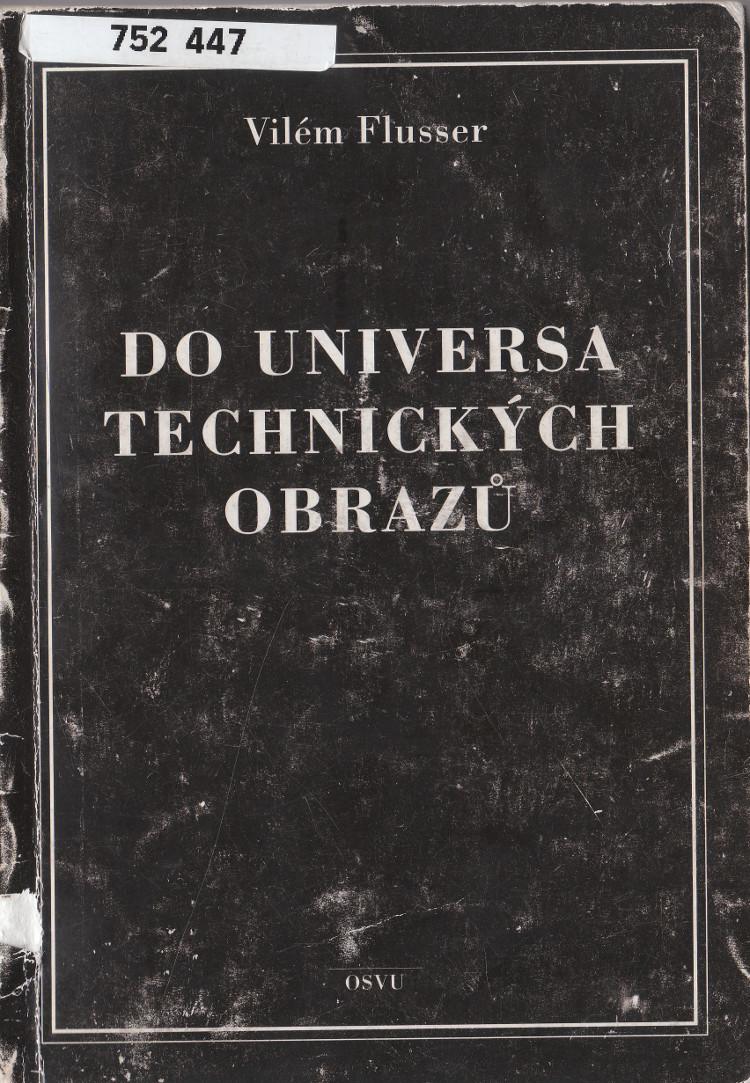Finger, Guldin, Bernardo: Vilém Flusser: An Introduction (2011)
Filed under book | Tags: · cultural theory, language, media theory, phenomenology, philosophy, technical image

The first introduction to a key thinker in twentieth-century media philosophy and cultural theory
A thorough introduction to Vilém Flusser’s thought, this book reveals his engagement with a wide array of disciplines, from posthuman philosophy, media studies, and history to migrant studies, art, and anthropology. This volume shows how Flusser’s media theory works are just one part of a greater mosaic of writings that bring to the fore cultural and cognitive changes in the twenty-first century.
by Anke K. Finger, Rainer Guldin, Gustavo Bernardo
Publisher University of Minnesota Press, 2011
Volume 34 van Electronic Mediations
ISBN 0816674787, 9780816674787
200 pages
Vilém Flusser: Into the Universe of Technical Images (1985–) [DE, HU, CZ, EN]
Filed under book | Tags: · communication technology, computing, cybernetics, database, entropy, image, media, media theory, philosophy, photography, postmodernism, technical image, technology, theory, virtual reality


Poised between hope and despair for a humanity facing an urgent communication crisis, this work by Vilém Flusser forecasts either the first truly human, infinitely creative society in history or a society of unbearable, oppressive sameness, locked in a pattern it cannot change. First published in German in 1985 and now available in English for the first time, Into the Universe of Technical Images outlines the history of communication technology as a process of increasing abstraction.
Flusser charts how communication evolved from direct interaction with the world to mediation through various technologies. The invention of writing marked one significant shift; the invention of photography marked another, heralding the current age of the technical image. The automation of the processing of technical images carries both promise and threat: the promise of freeing humans to play and invent and the threat for networks of automation to proceed independently of humans.
Originally published in German as Ins Universum der technischen Bilder, European Photography, 1985
Czech edition: Do universa technických obrazů
Translated by Jiří Fiala
Publisher OSVU, 2002
ISBN 8023875698
162 pages
English edition
Translated by Nancy Ann Roth
Introduction by Mark Poster
Publisher University of Minnesota Press, 2011
Volume 32 of Electronic Mediations
ISBN 0816670218, 9780816670215
224 pages
Review (Bob Hanke, International Journal of Communication)
Translator (EN)
Publisher (EN)
Ins Universum der technischen Bilder (German, 1985, added on 2016-8-4)
A technikai képek univerzuma felé (Hungarian, trans. József Maleczki, 2001; revised trans. Dalma Török, 2011; HTML, added on 2014-2-14)
Do universa technických obrazů (Czech, Jiří Fiala, 2002, no OCR, added on 2013-4-1)
Into the Universe of Technical Images (English, trans. Nancy Ann Roth, 2011, updated on 2012-7-17)
Vilém Flusser: Writings (2002)
Filed under book | Tags: · art, code, history, image, media, media theory, philosophy, photography, technical image, theory

Ten years after his death, Vilém Flusser’s reputation as one of Europe’s most original modern philosophers continues to grow. Increasingly influential in Europe and Latin America, the Prague-born intellectual’s thought has until now remained largely unknown in the English-speaking world. His innovative writings theorize—and ultimately embrace—the epochal shift that humanity is undergoing from what he termed “linear thinking” (based on writing) toward a new form of multidimensional, visual thinking embodied by digital culture. For Flusser, these new modes and technologies of communication make possible a society (the “telematic” society) in which dialogue between people becomes the supreme value.
The first English-language anthology of Flusser’s work, this volume displays the extraordinary range and subtlety of his intellect. A number of the essays collected here introduce and elaborate his theory of communication, influenced by thinkers as diverse as Martin Buber, Edmund Husserl, and Thomas Kuhn. While taking dystopian, posthuman visions of communication technologies into account, Flusser celebrates their liberatory and humanizing aspects. For Flusser, existence was akin to being thrown into an abyss of absurd experience or “bottomlessness”; becoming human required creating meaning out of this painful event by consciously connecting with others, in part through such technologies. Other essays present Flusser’s thoughts on the future of writing, the revolutionary nature of photography, the relationship between exile and creativity, and his unconventional concept of posthistory. Taken together, these essays confirm Flusser’s importance and prescience within contemporary philosophy.
Edited by Andreas Ströhl
Translated by Erik Eisel
Publisher University of Minnesota Press, 2002
Electronic Meditations series, Vol 6
ISBN 0816635641, 9780816635641
229 pages
review (Sean Cubitt, Leonardo Reviews)
PDF (updated on 2012-7-17)
Comment (0)
